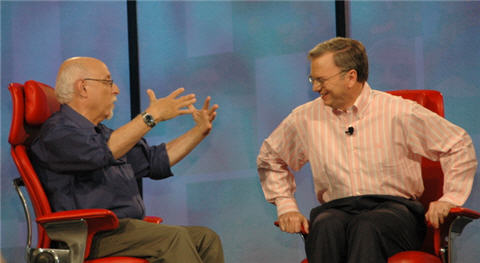D5: Google CEO Eric Schmidt tells Viacom to wait for the tools

Following YouTube co-founders Chad Hurley and Steve Chen, and then Viacom CEO and President Phillipe Dauman, Google CEO and now leader of YouTube Eric Schmidt sat down with Walt Mossberg for an interview at the D conference.
Schmidt added another dimension to the discussion regarding copyrights and Viacom's $1 billion suit against YouTube. Basically, he said that the DMCA protects Google and his company will provide tools to automate filtering for content owners.
"The DMCA is a safe haven for sites that host content as long as they take down content promptly. We are busy building tools to automate the process," Schmidt said. Mossberg asked Schmidt what mistake Viacom made in bringing the suit. "They should have waited for the tools."
Mossberg followed up, asking why the onus be on Viacom to wait for Google to come up with the tools. "We are building tools to make users' lives easier. It will be good for everybody. It's a complex mix of services, product, authentication and user choice. The more we automate tools the better," was the best Schmidt could muster in response.
Dauman wasn't there to respond, but he would likely submit that Viacom shouldn't have to wait for Google/YouTube tools while its content is being distributed illegally. It's hard to argue with that point, but Schmidt characterized Viacom's suits as merely a negotiating tactic.
It's clearly is a negotiating tactic, but that doesn't take away from the fact the Viacom's property has not been properly filtered out of YouTube.
Mossberg followed up on the notion that the YouTube community take up the cause of reforming copyright laws and lobbying Congress about the DMCA, which was signed into law in 1996. "There is a line of advocacy we should probably not cross as Google," Schmidt said. Just as Google is the "independent arbiter of the best search results, we always have this line we must follow." In other words, Google wants to stay neutral. "YouTube communities form so naturally that it is a reasonable expectation that the commuhity could evolve [in that direction]."
On changing the DMCA, which only applies in the U.S., Schmidt said, "People who suggest that the DMCA should be changed have vested interests. My own view is that the user content explosion is so profound and so obviously a big phenomenon will eventually cause the world to change."
Schmidt is just not in a hurry or willing to take a leadership role on what is obviously flawed copyright law.
